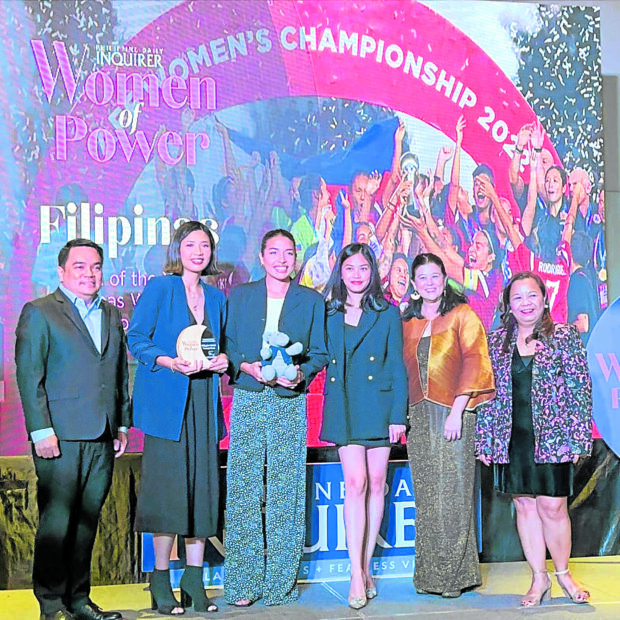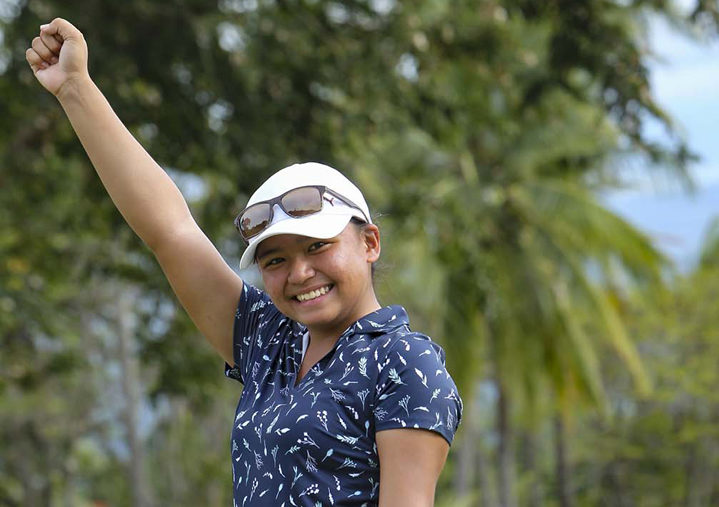
WORLD CUP-BOUND Receiving the award for the Filipinas during Inquirer’s Women in Power celebration were team coordinator Isabella Fernando (second from left), defender Hali Long (third from left) and assistant team manager Neille Anne Casalmer (fourth from left). Honoring them are lawyer Rudyard Arbolado (left), the Inquirer president and chief executive officer, Inquirer Group chief executive officer Sandy Prieto-Romualdez (fifth from left) and Inquirer associate publisher Juliet Labog-Javellana. —CONTRIBUTED PHOTO
That three of the honorees of the Inquirer’s Women of Power celebration were also the top awardees of the 2022 Inquirer Sports Awards is no coincidence.
In sports, the women have been shouldering the task of crafting trailblazing performances in the international arena.
“We’re breaking our own boundaries [and the] stereotypes that people have put on us,” Hali Long, the indefatigable defender of the Philippine women’s football team, told the Inquirer on Wednesday in a testimonial lunch for the 2022 Team of the Year.
She was referring to the Filipinas, as the national team is known. But Long might have been talking about the rest of the honorees of the Women of Power event, a celebration of amazing females that capped Women’s Month.
Hidilyn Diaz-Naranjo, who won the first gold medal for the country in Olympics history, led the list of female athletes feted alongside the most powerful women in the country in their respective fields, including the movers and shakers in the national economy.
Diaz-Naranjo, last year, won three gold medals in the weightlifting world championships to continue her dominant show in her sport. Honored alongside her were the Filipinas, who became the first national football team to book an appearance in the World Cup, tennis star Alex Eala and golf prodigy Rianne Malixi.
Surprise inclusion

Rianne Malixi (photo above) zeroes in on a seventh title.
—FILE PHOTO
Malixi’s inclusion may be somewhat of a surprise. The 16-year-old golfer, after all, is still at the start of a promising career that could lead her to bigger achievements in the future.
But her power lies in her willingness to embrace her role as golf’s next big thing and, more importantly, become a beacon for younger golfers.
“My goals are not just for myself but for the next generation and for my country,” Malixi told the Inquirer recently at the sidelines of a major international tournament hosted by Manila Southwoods. “That’s why it weighs on me a lot when I don’t play my best. I end up disappointing not just myself but I feel like I’m disappointing a lot of people.”
At such a young age, Malixi doesn’t merely accept the opportunity to fill in for the indomitable Yuka Saso, who opted for Japanese citizenship, as the country’s top golfer. She relishes it.
“I see myself [trying to fill that void] definitely in a few years time. I just have to keep on training and getting better,” Malixi said. “I try not to think about it and try to live in the present as much as possible. But I know I’m gonna get up there so I just have to train hard.”
Malixi is hoping to not just win glory for the country someday, but she looks forward to the time when a young golfer will be inspired to follow her path as a golf standout.
“That would be really heartwarming and huge for me because I know how hard I am working [to be an inspiration],” Malixi said.
GRAND SLAM QUEEN Alex Eala accomplished what no other Filipino—male or female—had done before her: Rule a tennis Grand Slam singles event. — Sarah Stier/Getty Images/AFP
Eala, on the other hand, made history as the first Filipino to win a girls’ singles title in the US Open.
And she handled the postgame ceremonies with aplomb, bringing tears to the Filipino supporters who watched her triumph in Flushing Meadows, New York, when she elected to give her speech in Tagalog.
And after dismissing girls world No. 3 Lucie Havlickova of the Czech Republic, 6-2, 6-4, in September last year, Eala told the crowd: “This victory is not only mine but ours.”
“I … fought with my heart for this trophy,” Eala added. “I did this not just for myself, I did it so that I could help Philippine tennis.”
Binding tie
Philippines’ Hidilyn Diaz celebrates as she wins gold in the women’s 55kg weightlifting event during the 31st Southeast Asian Games (SEA Games) in Hanoi on May 20, 2022. (Photo by Tang Chhin Sothy and TANG CHHIN SOTHY / AFP)
Before Eala’s championship triumph, no Filipino had made it past the semifinals of any tennis Grand Slam singles event.
If there’s one tie that binds all four female honorees, it’s the fact that they don’t allow themselves to be limited by the impossible.
In fact, for them, impossible is just a myth.
That mindset became popular when, after winning the weightlifting gold in the Tokyo Olympics in 2021, Diaz said: “This proves that the Filipino can [succeed].”
Filipino athletes usually diminish themselves in the international arena, their self-belief often taking a hit when competing against athletes from richer and more powerful countries.
But the moment Diaz edged out her Chinese foe for the gold in Tokyo, all that changed.
Winning was no longer the birthright of other nationalities. It was the Filipinos’ as well.
And the national women’s football team doubled down on that message when it achieved last year what many deemed improbable before: Book a berth in the football World Cup.
To accomplish that, the team had to live by the same mantra Diaz preached—there is no dream beyond the reach of the Filipino athlete.
“To live our dream, to live our truth, to Iive our passion, we had to switch our mindsets,” Long said.
Winning mindset
The Filipinas (photo above) celebrate in the din of fireworks and sprays of champagne after blanking Thailand, 3-0, for the country’s first Asean Football Federation Women’s Championship title on Sunday before a banner crowd at the Rizal Memorial Stadium pitch. –PFF PHOTO
The winning mindset has become so infectious that it has spread to all the Filipinas, who now believe they are meant for bigger things than just setting foot on this year’s World Cup field.
“We want to get out of our group,” Long said of the event that will be cohosted by Australia and New Zealand. “The more we say it, the more we believe it, the more we’re going to live it in our training, in our games coming up—Olympic qualifiers, the SEA (Southeast Asian) Games—so when it comes to the World Cup hopefully we manifested and did our best to attain [that] goal.”
But Long and teammate Inna Palacios, a member of the Filipinas’ goalkeeping corps, are not looking at the World Cup as the fruit of their labor, the final stop of a journey that began years ago when this group got together.
The World Cup, for the Filipinas, is just a prelude.
“We have to back these results,” Palacios said of the run of good results the team has been experiencing lately. “Me, personally, I don’t want this to be the last time or the only time [we compete in the World Cup]. I believe so much in our talent, so much in what the Filipino can do that I need to see this more often in my lifetime.”
“That feat (qualifying for the World Cup), it’s a testament that anything is possible. It’s a testament of our belief, not just in ourselves but what the team can do in the global stage and how we want to represent the Philippines,” Palacios added.
Long feels the same way.
“Everyone is super excited to see us go to the World Cup. But what happens after the World Cup? What can we do to sustain this? That is my ultimate goal. Yes, I wanna go to the World Cup and make it out of our group but that’s not my actual long-term goal,” she said.
“My long-term goal is what can I do to keep going there and what can I do to keep my country there, regardless if I’m on the field or not.”
Annual awards
Diaz-Naranjo, the Filipinas and Eala were also among the top athletes honored by Inquirer Sports for its annual awards.
Diaz-Naranjo bagged the Best Performance by a Female Athlete after her three-gold feat in the world championships. Winning alongside her was pole vaulter EJ Obiena, whose bronze in the Athletics World Championships won for him the Best Performance by a Male Athlete trophy.
Eala took home the Junior Athlete of the Year trophy while the Filipinas were named Team of the Year.
Other awardees included Philippine Olympic Committee president Abraham “Bambol” Tolentino for Decision-maker of the Year, Filipinas coach Alen Stajcic for Coach of the Year and Filipinas striker Sarina Bolden for Quote of the Year.
“Philippines, you are going to remember this team and you’re going to see us in the World Cup so don’t forget about us because we’re coming back,” Bolden said after the team qualified for the Fifa (International Federation of Association Football) Women’s World Cup via the Asian Cup in India last year.
This year’s Inquirer Sports Awards will be the last time the event will not be held on a live stage. The team behind the awards night met on Wednesday to finalize plans of bringing the event to the live stage for the first time for the 2023 edition.

